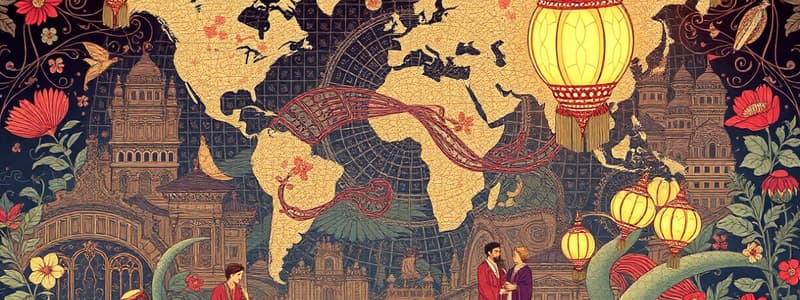Podcast
Questions and Answers
Which of the following best describes economic globalization?
Which of the following best describes economic globalization?
- Decreasing integration of economies.
- Isolation of national markets.
- Focus on local production only.
- Increasing integration of economies. (correct)
Transnational Corporations (TNCs) typically have a centralized management.
Transnational Corporations (TNCs) typically have a centralized management.
False (B)
Which of the following is NOT a characteristic of TNCs and MNCs?
Which of the following is NOT a characteristic of TNCs and MNCs?
- Being powerful drivers of economic growth.
- Operating in only one country. (correct)
- Having strong international networks.
- Operating in multiple countries.
An international monetary system governs the rules for valuing and exchanging _________.
An international monetary system governs the rules for valuing and exchanging _________.
What is the main feature of the Gold Standard?
What is the main feature of the Gold Standard?
The Gold Standard remained stable throughout World War I.
The Gold Standard remained stable throughout World War I.
Which currency was the only convertible currency to gold under the Bretton Woods System?
Which currency was the only convertible currency to gold under the Bretton Woods System?
In what year was the Bretton Woods Agreement negotiated?
In what year was the Bretton Woods Agreement negotiated?
Which organization is a major source of funding and knowledge for developing countries?
Which organization is a major source of funding and knowledge for developing countries?
The IDA focuses on the world's __________ countries.
The IDA focuses on the world's __________ countries.
The IMF aims to promote financial instability and monetary cooperation.
The IMF aims to promote financial instability and monetary cooperation.
Which of the following is a goal of the International Monetary Fund (IMF)?
Which of the following is a goal of the International Monetary Fund (IMF)?
Which concept of globalization refers to the intensified exchange of things between pre-constituted units?
Which concept of globalization refers to the intensified exchange of things between pre-constituted units?
Transformation in globalization only affects the identity of small units.
Transformation in globalization only affects the identity of small units.
__________ is defined as meaning beyond, and involves going beyond ordinary limitations.
__________ is defined as meaning beyond, and involves going beyond ordinary limitations.
Which ancient trade route is an example of early globalization?
Which ancient trade route is an example of early globalization?
Globalization primarily started in the 1980s.
Globalization primarily started in the 1980s.
Which aspect of globalization includes traditions, customs, and cuisines?
Which aspect of globalization includes traditions, customs, and cuisines?
Globalization leads to 'deterritorialization', where physical space loses its hold on __________ relations.
Globalization leads to 'deterritorialization', where physical space loses its hold on __________ relations.
Which of the following is an aspect/area linked to globalization?
Which of the following is an aspect/area linked to globalization?
Flashcards
Economic globalization
Economic globalization
Increasing integration of economies around the world through movement of goods, services, and capital.
Transnational Corporations (TNC)
Transnational Corporations (TNC)
are major forces in economic globalization that do not have centralized management and subsidiaries.
Multinational Corporations (MNC)
Multinational Corporations (MNC)
have centralized management that enforces all the policies and rules, plus they have subsidiaries.
TNCs and MNCs
TNCs and MNCs
Signup and view all the flashcards
International Monetary System
International Monetary System
Signup and view all the flashcards
Gold Standard
Gold Standard
Signup and view all the flashcards
Bretton Woods System
Bretton Woods System
Signup and view all the flashcards
World Bank
World Bank
Signup and view all the flashcards
The International Monetary Fund (IMF)
The International Monetary Fund (IMF)
Signup and view all the flashcards
Transference
Transference
Signup and view all the flashcards
Transformation
Transformation
Signup and view all the flashcards
Transcendence
Transcendence
Signup and view all the flashcards
The Silk Road
The Silk Road
Signup and view all the flashcards
Politics
Politics
Signup and view all the flashcards
Environment
Environment
Signup and view all the flashcards
Culture
Culture
Signup and view all the flashcards
Globalization
Globalization
Signup and view all the flashcards
Socialization
Socialization
Signup and view all the flashcards
Religion
Religion
Signup and view all the flashcards
Technology
Technology
Signup and view all the flashcards
Study Notes
- Globalization is a broad topic and cannot be limited to a single definition or discipline.
Origin
- Globalization comes from the root word Global.
- Meydan Larousse (Turkish encyclopedia) defines "global" as "undertaken entirely."
- In French, it means "homogeneity," indicating uniformity or similarity.
- Most countries worldwide are experiencing and undergoing globalization.
Summarized Definition
- Globalization connects people across large distances in diverse ways. e.g. Sushi, Kdrama, and Songs
- It is an interaction among people, primarily an economic process of integration, with social and cultural aspects.
- It is equal to deteritorialization, which is a process where physical spaces lose their hold on social relations.
- Also includes the dissemination of information and knowledge.
Aspects/Areas Linked to Globalization
- Culture includes traditions, customs, and cuisines.
- The economy includes activities outside a country's borders that directly affect its economy, such as concerts/fan meetings, international shipping, and the establishment of international brands or stores.
- Politics includes bilateral/multilateral relations between countries/states.
- Also includes international organizations like Non-Governmental Organizations (NGO), Intergovernmental Organizations (IGO), and Multinational corporations (MNC).
- The environment is a platform for discussing several environmental issues through media and includes multiple advocacies and projects by organizations and nations.
- Socialization includes communication and interaction of people in different countries.
- Religion encompasses the spread of religion and teachings, inter-border movement, spread, and conversion of religion through early interactions or colonization.
- Ideology includes ideologies in International Relations such as Realism, Liberalism, Marxism and Constructivism.
- Technology refers to several innovations and modernization, such as computers, gadgets, and websites.
- Media includes digital media, print media, and social media
- Globalization is the inter-border movement of products, services, capital, technology, ideas, information, culture, and nation.
3 Concepts of Globalization
- Transference involves intensified exchange of things between pre-constituted units and across existing unit boundaries for economic, political, or cultural purposes.
- Transference is an inside-out process.
- Transformation refers to the process of transformation that occurs at the systems level and affects that system as much as it affects the identity of the units.
- Transformation is an outside-in process which alter their identity.
- Transcendence refers to meaning beyond ordinary limitations.
- Globalization is neither inside nor outside, but dissolves the distinction.
- States die and total emancipation finds the door open.
- Organizations diminish the limit or boundaries of each member nation and offer cooperation and bond between nations and move as one
History/Emergence of Globalization
Early History
- Early records of trade existed between the civilization of Sumeria and Indus Valley.
- The Silk Road was an ancient trade route that linked the Western world with the Middle East and Asia.
- Disease also traveled the Silk Road and caused the Black Death in the mid-14th century.
Medieval
- Age of Discovery/Expedition
- Christopher Columbus and Vasco De Gama
- Colonization by European countries like Spain and Philippines
Pre-modern (Industrial Revolution)
- Industrialization brought about the growth of machine production and factories.
- Changes in economic and social activities began in the 18th century with the replacement of hand tools by machinery and mass production.
- The need for income motivated men to leave their families behind for jobs.
- Women also worked outside the home, often worked as domestic servants or in the textile mills during the first century of industrialization.
- Child labor was rampant in the textile industry during the first century of industrialization.
- These women and children were paid very little and routinely compelled to work 16 hours per day or longer.
Modern
- Great development in commerce, abolishment of tariffs and taxes, creation of global corporations, and culture and traditions.
- Innovation, technology and rise of media is apparent
Misconceptions (Explained by Eriksen, 2014)
- Started during the 1980s or early 2000s.
- Economic Imperialism/Westernization.
- Homogenization
- Against Human Rights.
- Pose threats to local identities
Economic Globalization and Market Integration
- Economic globalization increases the integration of economies around the world through the movement of goods, services, and capital.
Major Players in Economic Globalization
- TNC and MNC are the main driving forces of economic globalization of the last 100 years.
Transnational Corporations (TNC)
- They do not have a centralized management.
- They do not have subsidiaries.
Multinational Corporations (MNC)
- They have centralized management which enforces all the policies and rules.
- They have subsidiaries.
- Both TNC and MNC operate in 2 or more countries with a wide range of activities.
- Both have established strong international networks.
- Both are powerful drivers of economic growth.
International Monetary System
- Refers to the system and rules that govern the use and exchange of money around the world and between countries.
- Each country has its own currency as money, and the international monetary system governs the rules for valuing and exchanging these currencies.
Gold Standard
- An international monetary system where a country's currency has a value directly linked to Gold.
- Countries must make several adjustments to maintain their exchange rates.
- It functioned reasonably well because it was backed by British Hegemony and other major powers.
- The primary objective is to promote monetary openness and stability.
- It broke down during World War 1 when most nations suspended the convertibility of their cash to gold.
Bretton Woods System
- An international monetary system where a country's currency was pegged to the US Dollar's value
- The only convertible currency to Gold was the US Dollar.
- The agreement stemmed from Bretton Woods Agreement which was negotiated in July 1944 by the delegates coming from 44 countries
World Bank
- The World Bank Group is one of the world's largest sources of funding and knowledge for developing countries.
- Its five institutions share a commitment to reducing poverty, increasing shared prosperity, and promoting sustainable development.
- The World Bank Group is a unique global partnership: five institutions working for sustainable solutions that reduce poverty and build shared prosperity in developing countries.
Five Institutions:
-
The International Bank for Reconstruction and Development (IBRD)
-
The International Development Association (IDA)
-
The International Finance Corporation (IFC)
-
The Multilateral Investment Guarantee Agency (MIGA)
-
The International Centre for Settlement of Investment Disputes (ICSID)
-
IDA focuses on the world's poorest countries
-
IBRD assists middle-income and creditworthy poorer countries.
-
IFC, MIGA, and ICSID focus on strengthening the private sector in developing countries.
International Monetary Fund (IMF)
- Works to achieve sustainable growth and prosperity for all of its 190 member countries.
- Does so by supporting economic policies that promote financial stability and monetary cooperation, which are essential to increase productivity, job creation, and economic well-being.
Studying That Suits You
Use AI to generate personalized quizzes and flashcards to suit your learning preferences.




